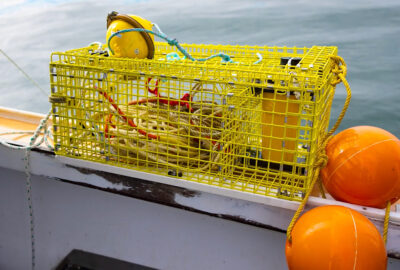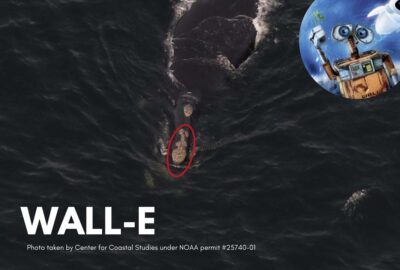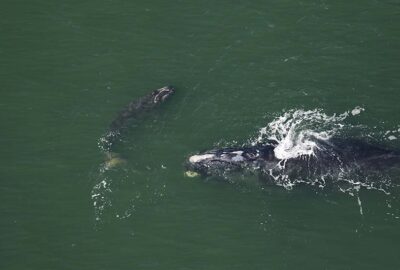2022–2023 North Atlantic Right Whale Mother and Calf Pairs
By New England Aquarium on Thursday, December 08, 2022


(Updated May 15, 2023)
From December through March, during “calving season,” right whales and their young can be spotted together in the waters off the Southeastern coast of the United States, where the whales migrate to give birth. During this time, researchers on and above the water keep their eye out for whale mothers and their calves, a hopeful sight for the survival of these critically endangered marine animals.
With an estimated 340 whales left, researchers at the New England Aquarium’s Anderson Cabot Center for Ocean Life are working diligently to learn more about and protect this species, from right whale biologists conducting research via boats and planes to working in the laboratory to study their health and hormones.
Throughout calving season, right whale researchers manage a detailed list of mom and calf pairs with biographical information that includes photographs, lineage, where the whales were last seen, how they were named, and the challenges each whale has faced. This data comes from the North Atlantic Right Whale Catalog, which is maintained by researchers with the Aquarium.
Calving season ends as the whales move back north for the spring and summer. During the 2022-2023 season, there were 11 mothers with associated calves and one unassociated neonate (or newborn whale) documented. While every right whale birth is a reason to celebrate, this number is far below what is needed to sustain this critically endangered species.
Meet this year’s mother and calf pairs below, and learn more about what you can do to help protect right whales here.
Recent sightings
Pediddle – Catalog #1012
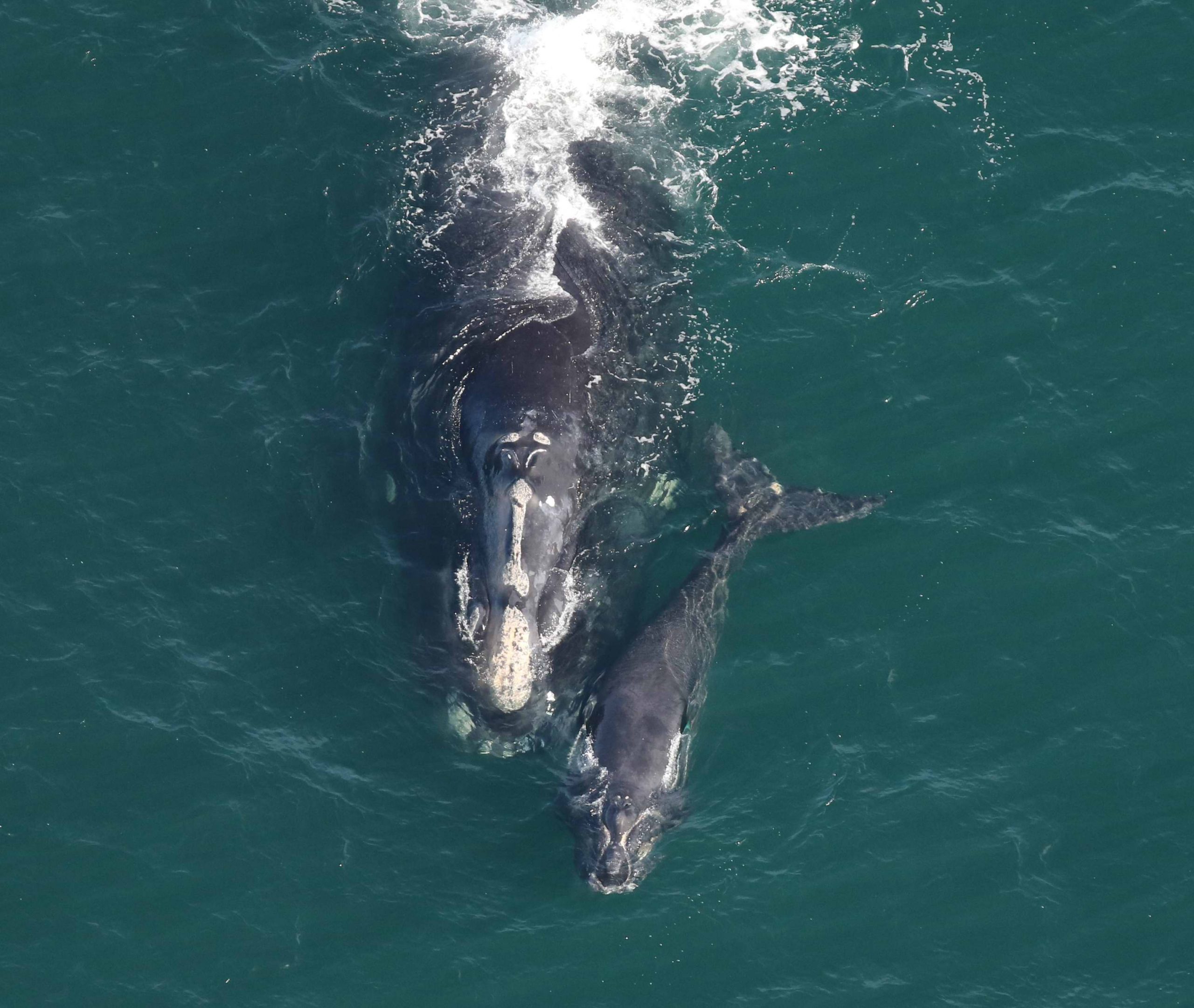 Right whale Catalog #1012 ‘Pediddle’ and calf sighted on January 20, 2023, approximately 18nm east of Blackbeard Island, GA. Photo credit: Clearwater Marine Aquarium Research Institute, taken under NOAA permit #20556
Right whale Catalog #1012 ‘Pediddle’ and calf sighted on January 20, 2023, approximately 18nm east of Blackbeard Island, GA. Photo credit: Clearwater Marine Aquarium Research Institute, taken under NOAA permit #20556
Birth year: unknown (first seen in 1978)
Age: >45 years old
Last calving year: 2017
Previous calves: 8 (Catalog #1308, Catalog #1605, Catalog #3512 – Contrail, Catalog #3912 – Sickle, Catalog #4730, and 3 uncatalogued calves in 1991, 1996, 2001)
Other known relatives: 4 grand-calves, 4 great grand-calves
Direct human impacts: 1 entanglement
Human impacts on family members: 23 entanglements, 3 vessel strikes
Pediddle was seen by Clearwater Marine Aquarium’s Georgia team on January 20, 2023, with her ninth known calf. She was named for the bright circular scar on the left side of her head, which looks like a headlight—a car with one headlight out is called a “pediddle” or a “padiddle.” While Pediddle is lucky enough to have only one documented human-caused injury, her family, like many in this species, serves as the poster family for the hardship caused by humans.
Her daughter Catalog #1308 was killed by a vessel strike while still caring for her young calf. Her granddaughter Snow Cone (Catalog #3560), who was featured in the documentary Last of the Right Whales and a recent journal article, was entangled at least five times. Snow Cone was most recently spotted in September in poor condition and has almost certainly died as a result of her injuries, and the survival of her recent calf is in question as well.
Pediddle’s great-grandson Cottontail (Catalog#3920) died from an entanglement, and Catalog #5060, Snow Cone’s 2020 calf, was hit by two different vessels and killed when he was less than seven months old. The fate of Pediddle’s female lineage rests with her granddaughters, Chiminea and Sickle (Catalog #3912), who is yet to have her first calf, and Pediddle’s newborn calf, if it is female.
Pediddle has never been seen in the Gulf of St Lawrence. Instead, she consistently brings her young calves to the waters around Massachusetts. Pediddle has the honor of sharing the longest calving history with Grand Teton (Catalog #1145) and Baldy (Catalog #1240). All three have been calving for at least 40 years!
Spindle – Catalog #1204
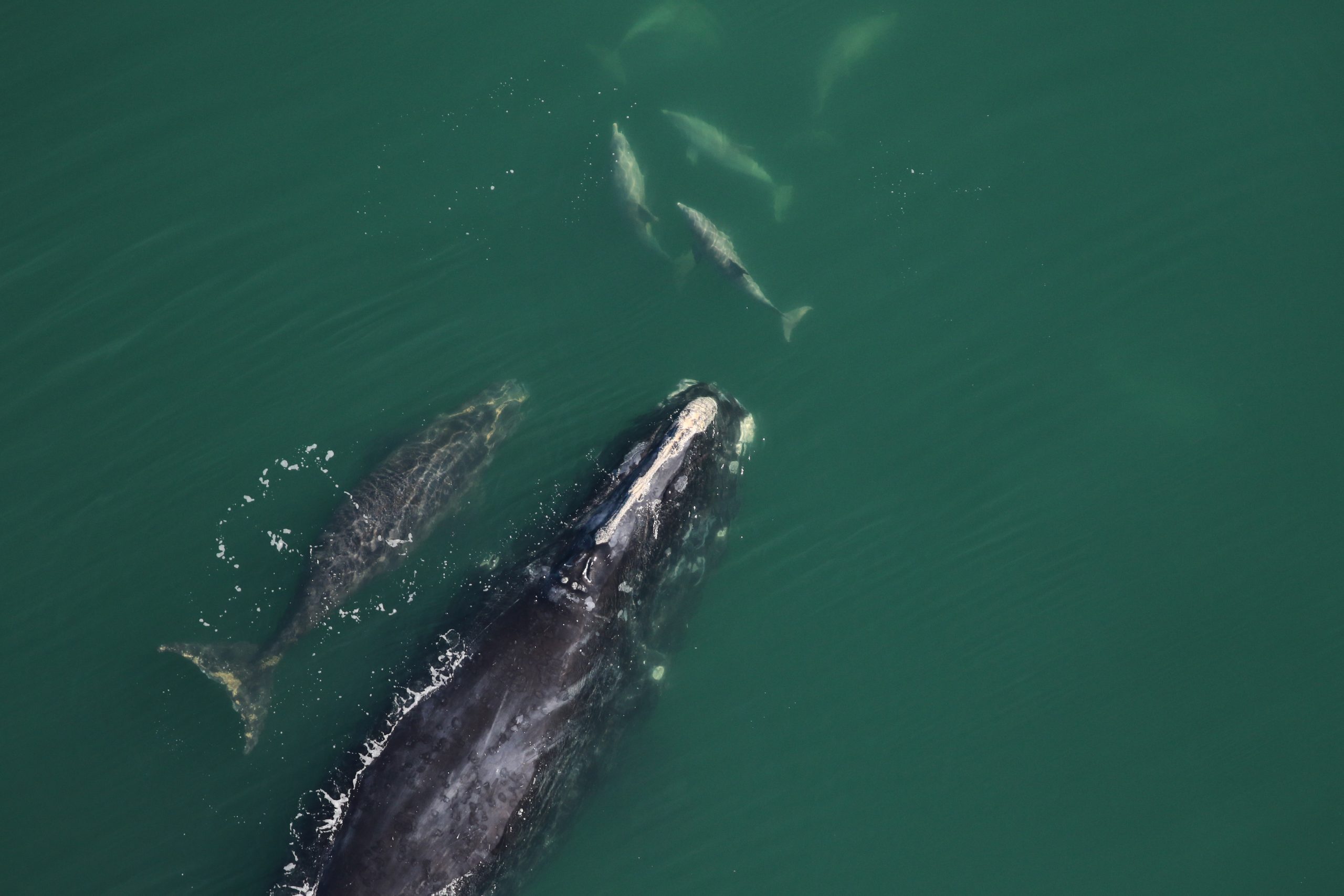 Right whale Catalog #1204 “Spindle” and calf sighted on January 7, 2023, approximately 6nm east of St. Catherines Island, GA. Photo credit: Clearwater Marine Aquarium Research Institute, taken under NOAA permit #20556
Right whale Catalog #1204 “Spindle” and calf sighted on January 7, 2023, approximately 6nm east of St. Catherines Island, GA. Photo credit: Clearwater Marine Aquarium Research Institute, taken under NOAA permit #20556
Birth year: unknown (first seen in 1982)
Age: >41 years old
Last calving year: 2019
Previous calves: 9 (Catalog #1807, Catalog #2904 – Vega, Catalog #3504, Catalog #3904 – Champagne, Catalog #4304, Catalog #4904, and 3 uncatalogued calves)
Other known relatives: 1 grand-calf
Direct human impacts: 1 entanglement
Human impacts on family members: 11 entanglements
Spindle was seen by Clearwater Marine Aquarium’s Georgia team on January 7, 2023, with her tenth known calf–fitting for the tenth mom of the season! This latest calf is especially exciting as Spindle is the first mom that we know of to have ten documented calves. This makes Spindle the female with the most known calves in the known population! Spindle was first seen in 1982 at an unknown age, so it’s possible she had more calves previously that we don’t know about. Of her six cataloged calves, five are still seen regularly; one of them, Champagne, gave birth to Spindle’s first grandchild in 2021! Spindle has been fairly lucky in her prolific life, experiencing only one minor documented entanglement. Her offspring have not been as lucky. Champagne has experienced at least four entanglements, with the latest leaving some significant scars.
Pilgrim – Catalog #4340
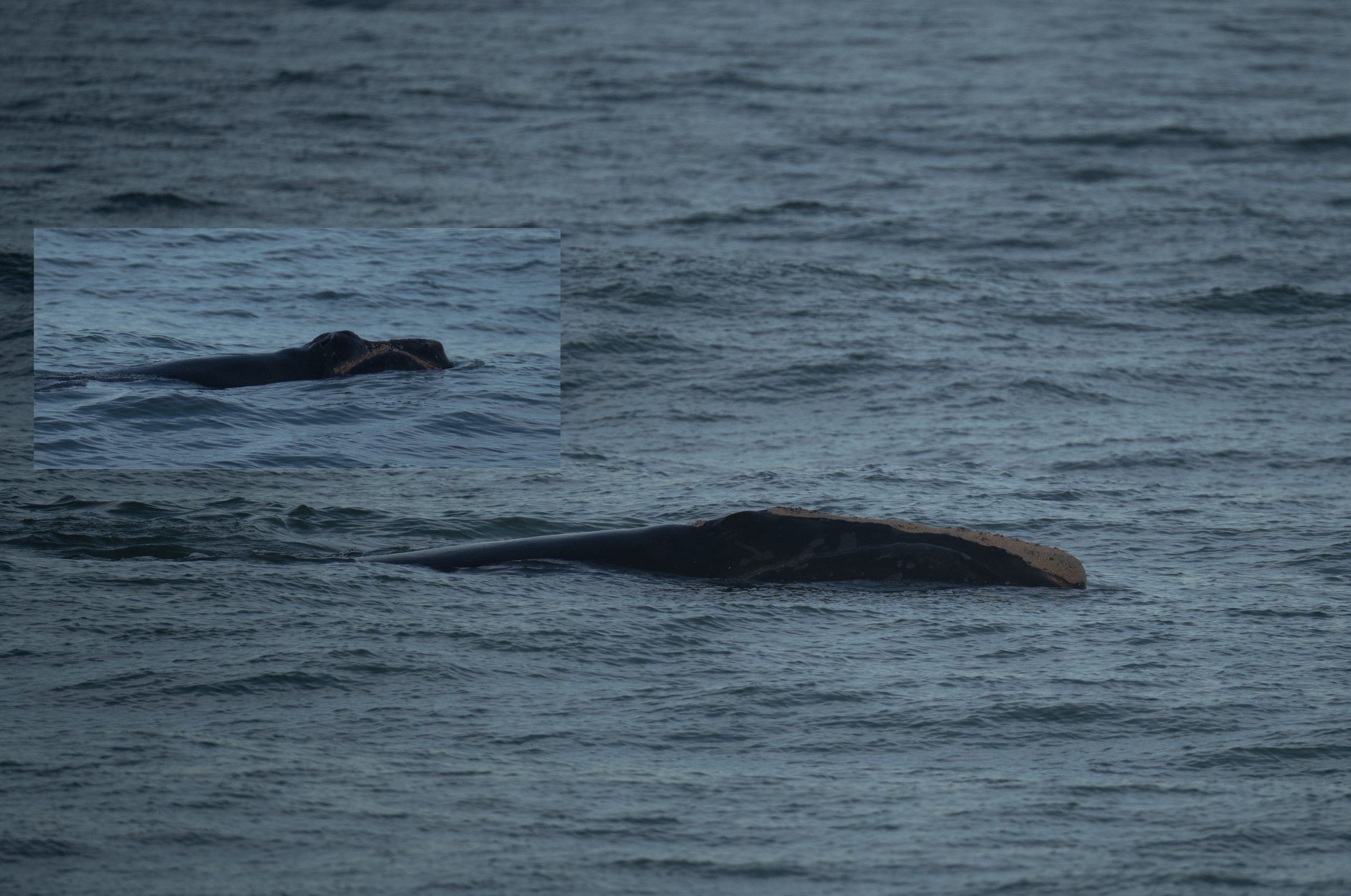 A composite image of “Pilgrim” (Catalog #4340) and calf, sighted by beachgoers off Canaveral, FL on December 30. Photo credit: Photo taken from land by Joel Cohen/Marine Resources Council
A composite image of “Pilgrim” (Catalog #4340) and calf, sighted by beachgoers off Canaveral, FL on December 30. Photo credit: Photo taken from land by Joel Cohen/Marine Resources Council
Birth year: 2013
Age: 10 years old
Last calving year: N/A
Previous calves: 0
Other known relatives: 6 siblings, 12 nieces/nephews, 5 great nieces/nephews
Direct human impacts: 1 entanglement
Human impacts on family members: 67 entanglements & 9 vessel strikes
Pilgrim is our first new mom of the season! She was seen with her first known calf just off Canaveral, Florida, on December 30, 2022. The sighting was reported to a volunteer sighting network hotline and verified by the Marine Resources Council, who was able to document the pair from the beach! Born in 2013, Pilgrim has a unique origin story that garnered her name. She was first seen with her mom, not in the southeast calving grounds, but just off the Pilgrim Power Station in Cape Cod Bay in January! Researchers were worried that a calf born in the cold northeast winter would struggle to survive, but Pilgrim is easing those worries as a 10-year-old first-time mother! Born to Wart (Catalog #1140), a well-known whale, Pilgrim has lots of siblings, nieces, and nephews. Her 24 known relatives have collectively experienced at least 76 human-caused injuries; most recently, her great-nephew was struck and killed by a sport fishing vessel at just one month old in 2021.
War – Catalog #1812
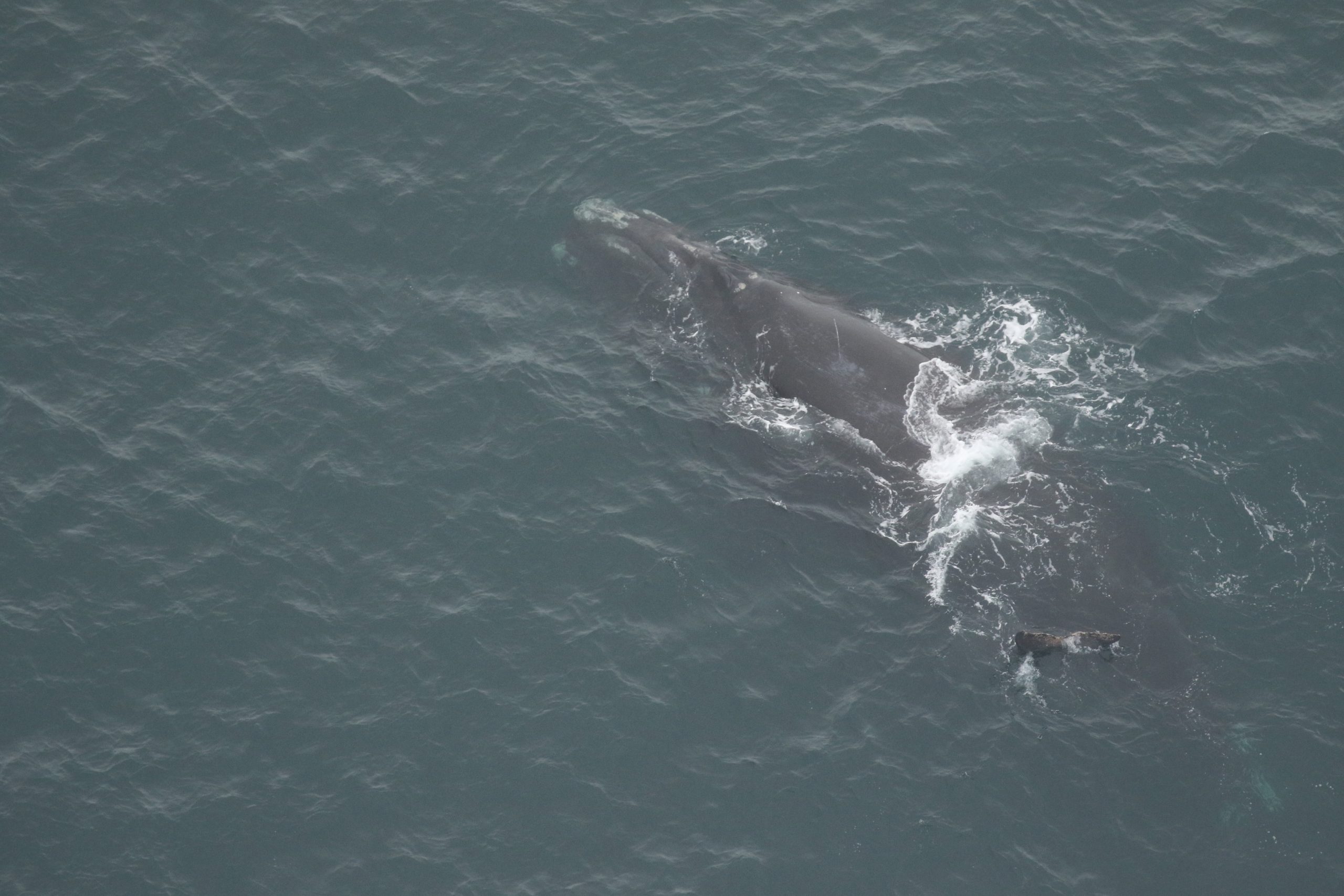 Right whale “War” (Catalog #1812) and calf were sighted on December 29, 2022, approximately 10.6nm off of the St. Mary River, bordering GA and FL. Photo credit: Clearwater Marine Aquarium Research Institute, taken under NOAA permit #20556
Right whale “War” (Catalog #1812) and calf were sighted on December 29, 2022, approximately 10.6nm off of the St. Mary River, bordering GA and FL. Photo credit: Clearwater Marine Aquarium Research Institute, taken under NOAA permit #20556
Surveys funded by GADNR and NOAA Fisheries
Birth year: Unknown (first seen in 1988)
Age: >35 years old
Last calving year: 2016
Previous calves: 6 (Catalog #3680 – Seadragon, Catalog #3812 – Nimbus, Catalog #4212, Catalog #4612, and 2 uncatalogued calves)
Other known relatives: N/A
Direct human impacts: 5 entanglements
Human impacts on family members: 9 entanglements & 1 vessel strike
War was seen by Clearwater Marine Aquarium’s Georgia team on December 29, 2022, with her seventh known calf. Another whale of unknown age, she was first seen in 1988, making her at least 35 years old. War was named in part for her catalog number, after the War of 1812, and for her callosity that gives the appearance of cannons.
Out of her six previous known calves, her first two were never cataloged (one died when just two months old), but three are still seen regularly. Even with a relatively small known family, War and all her offspring have experienced many entanglement injuries; luckily, most have been fairly minor.
Viola – Catalog #2029
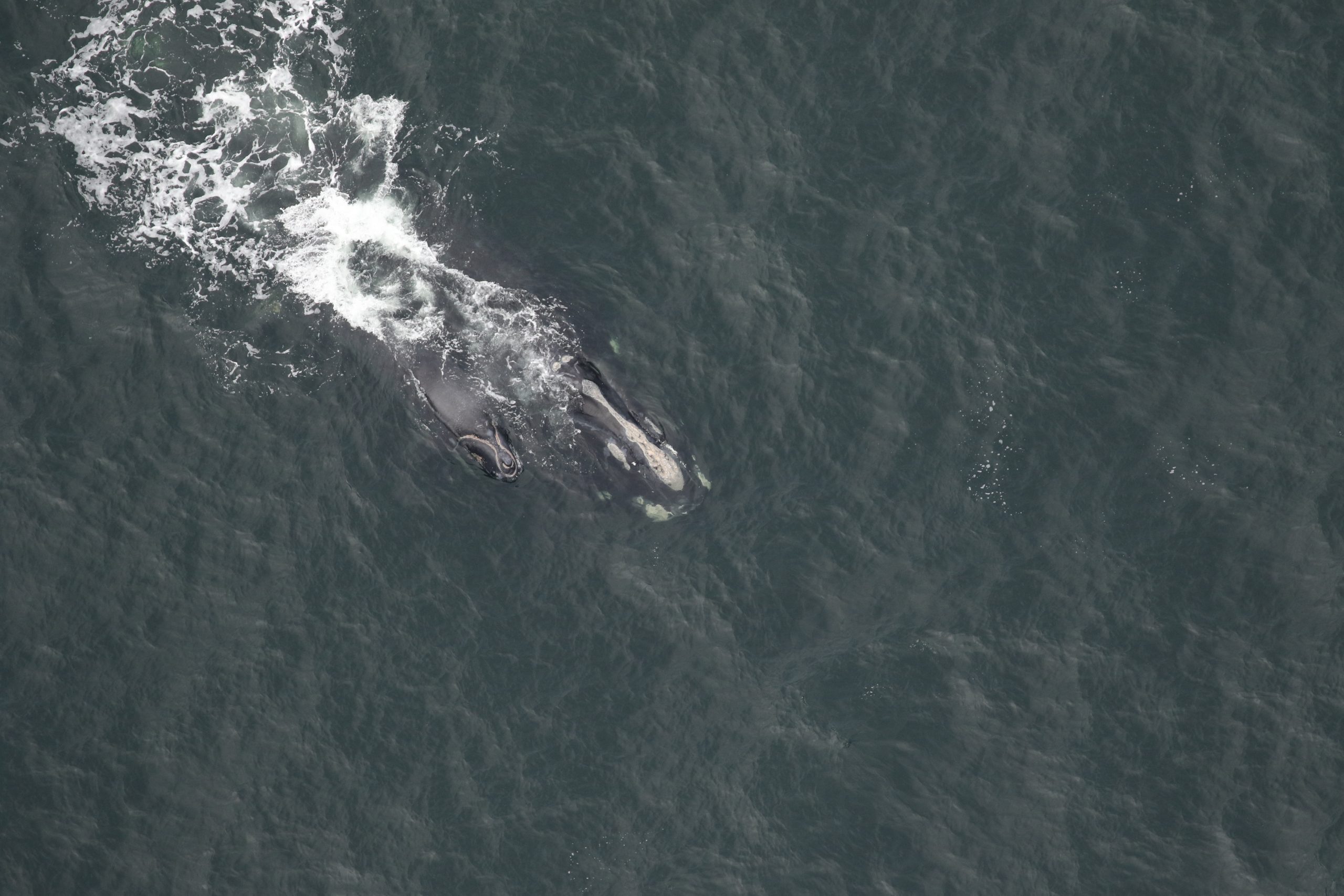 Right whale “Viola” (Catalog #2029) and calf sighted on December 29, 2022, approximately 9.1nm east of Amelia Island, FL. Photo credit: Clearwater Marine Aquarium Research Institute, taken under NOAA permit #20556
Right whale “Viola” (Catalog #2029) and calf sighted on December 29, 2022, approximately 9.1nm east of Amelia Island, FL. Photo credit: Clearwater Marine Aquarium Research Institute, taken under NOAA permit #20556
Surveys funded by GADNR and NOAA Fisheries
Birth year: 1990
Age: 33 years old
Last calving year: 2011
Previous calves: 3 (Catalog #3329, Catalog #3629, Catalog #4129)
Other known relatives: Parents, 2 siblings, 1 nephew
Direct human impacts: 6 entanglements
Human impacts on family members: 23 entanglements
Viola was seen by Clearwater Marine Aquarium’s Georgia team on December 29, 2022, with her fourth known calf. She was born in 1990 to mother Ipanema (Catalog #1629) and was sired by male Mohawk (Catalog #1320). One of her siblings, Cashew (Catalog #3292), was in the latest group of whales to get named!
Viola was named for the shape of her callosity which resembles the stringed instrument. Viola’s only known daughter, Catalog #3329, died in 2019, leaving Viola with no grandkids. Her daughter’s death was one of nine detected in Canadian waters that year—part of the Unusual Mortality Event this species is experiencing. In addition to high mortality, females are calving less frequently than the historic average of every 3–4 years. Viola’s last calf was born 12 years ago—one of the longer calving gaps!
Aphrodite – Catalog #1701
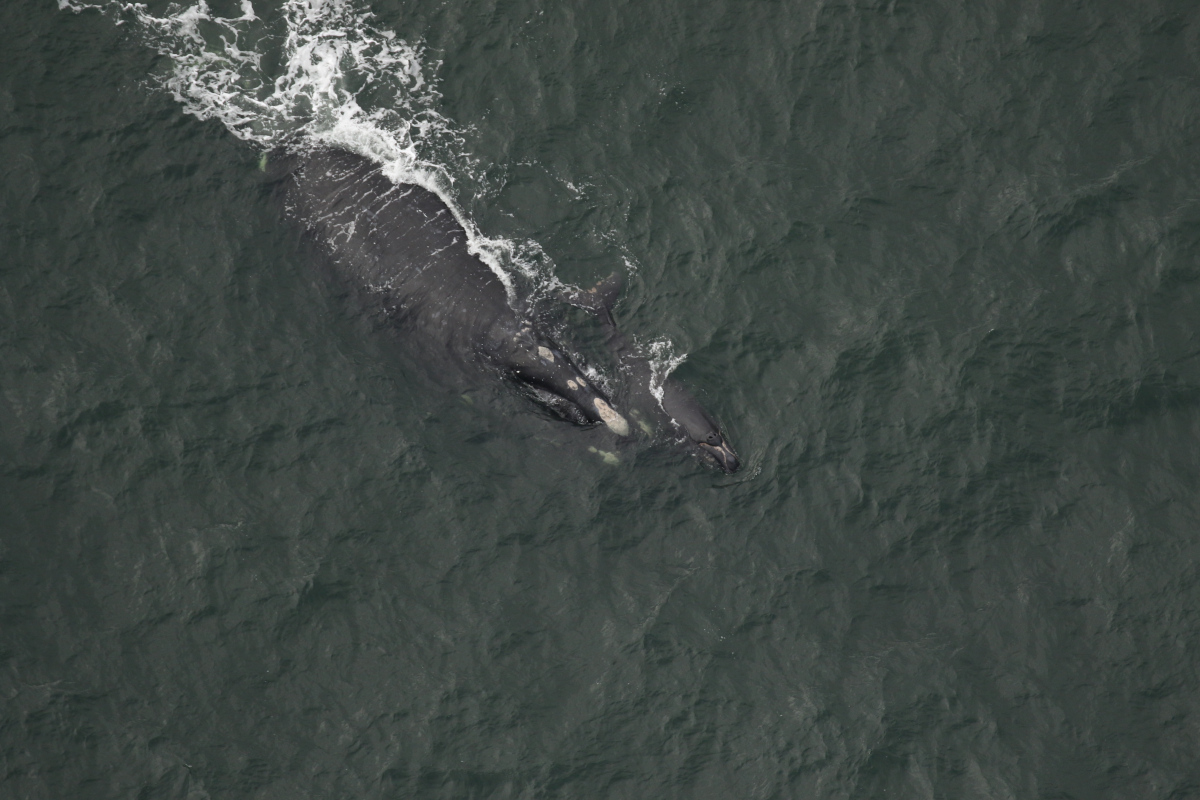
Right whale “Aphrodite” (Catalog #1701) and calf were sighted on December 29, 2022, approximately 4nm east of Nassau Sound, FL. Photo credit: Clearwater Marine Aquarium Research Institute, taken under NOAA permit #20556
Surveys funded by GADNR and NOAA Fisheries
Birth year: 1987
Age: 36 years old
Last calving year: 2015
Previous calves: 6 (Catalog #2601, Catalog #3101 – Harmonia, Catalog #3401 – Tux, Catalog #3701 – Eros, Catalog #4001, Catalog #4501)
Other known relatives: Mother, 4 grandkids
Direct human impacts: 5 entanglements
Human impacts on family members: 28 entanglements & 3 vessel strikes
Aphrodite was seen by Clearwater Marine Aquarium’s Georgia team on December 29, 2022, with her seventh known calf. She was born in 1987 to her mother, Catalog #1219, who unfortunately died just two years later. Four out of her six known offspring are still seen regularly, including Harmonia who has gone on to give Aphrodite three grandkids, despite being entangled at least eight times. Aphrodite’s family is no stranger to human-caused injuries; she herself was named for a heart-shaped scar on her side, and her granddaughter Gully (Catalog #4601), was named for a large indent in her head caused by a severe entanglement.
This past summer, Aphrodite was spotted off a beach in New Hampshire, proving that these whales are truly right in our backyard in New England. Hopefully, one day we will spot this new calf off a local beach as a healthy adult.
Aphrodite is also one of our sponsorship whales! Learn more about sponsoring a right whale here.
Smoke – Catalog #2605
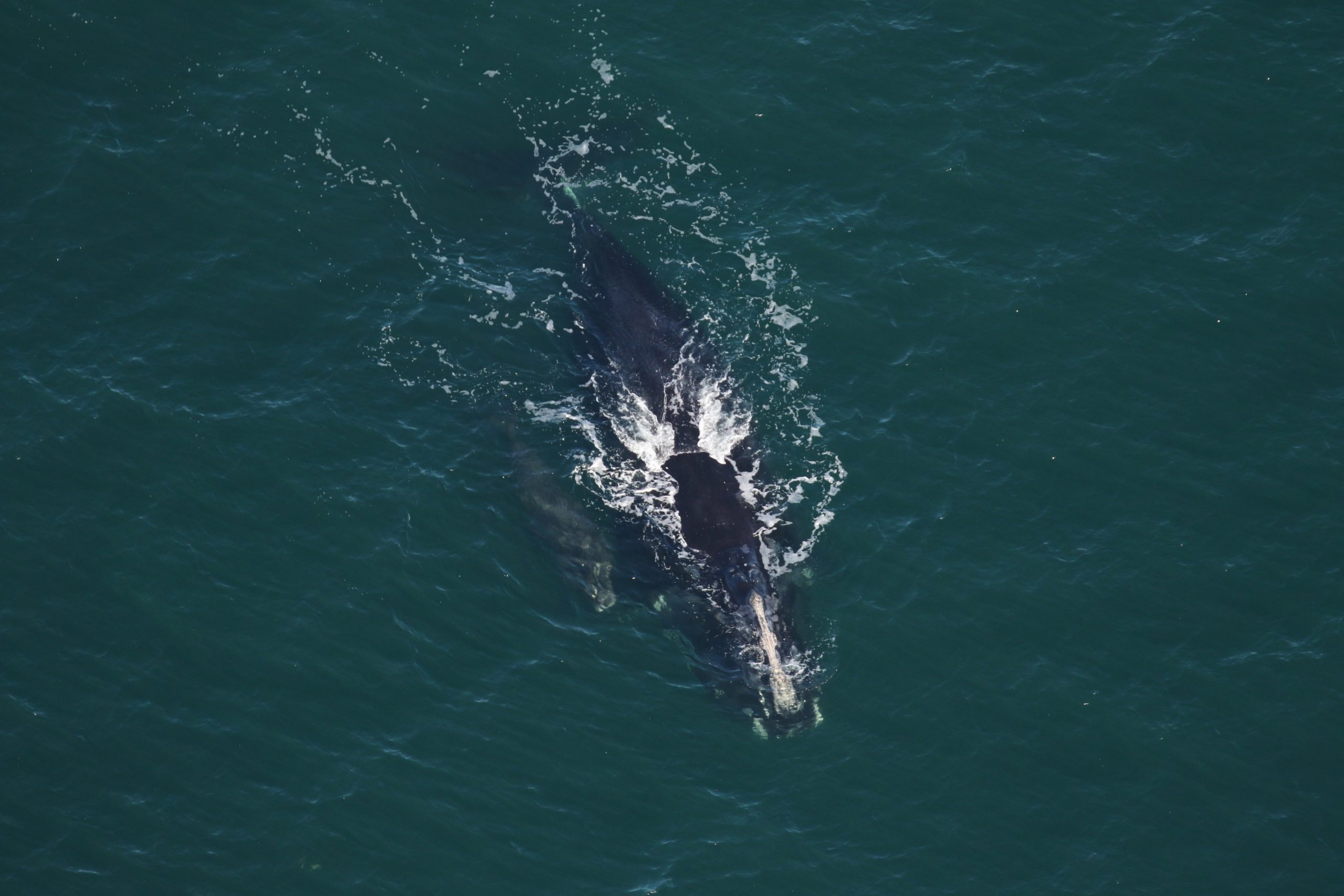 Right whale Catalog #2605 “Smoke” and calf, sighted December 27, 2022, approximately 6.8nm east of St. Catherine’s Island, GA. Photo credit: Clearwater Marine Aquarium Research Institute, taken under NOAA permit #20556-01
Right whale Catalog #2605 “Smoke” and calf, sighted December 27, 2022, approximately 6.8nm east of St. Catherine’s Island, GA. Photo credit: Clearwater Marine Aquarium Research Institute, taken under NOAA permit #20556-01
Surveys funded by GADNR and NOAA Fisheries
Birth year: 1996
Age: 27 years old
Last calving year: 2015
Previous calves: 3 (Catalog #3705 – Checkmark, Catalog #4005, and Catalog #4505)
Other relatives: Parents, maternal grandparents, 7 aunts/uncles, 4 siblings, 1 nephew
Direct human impacts: 4 entanglements
Human impacts on family members: 39 entanglements & 3 vessel strikes
Smoke was seen by Clearwater Marine Aquarium’s Georgia team on December 26 and December 27, 2022 with her fourth known calf. Thanks partially to genetics, we are able to trace a fair amount of Smoke’s family tree. She was born to mother, Phoenix (#1705), in 1996 and sired by a male known as Sliver (#1227). Her maternal grandparents (Mavynne – #1151, and King Richard – #1147) collectively had 8 offspring (Smoke’s mother, and 7 aunts and uncles). With such a large known family, it’s no surprise they have experienced many injuries, out of her 19 relatives all but two have known human-caused injuries, and those 2 were never resighted beyond their birth year. Smoke’s most recent calf #4505 was found deceased with entanglement injuries at the age of 3. Her first calf and only known daughter, 16-year-old Checkmark, is still seen regularly despite a run in with a vessel that remove part of her tail. Perhaps Checkmark will be the first to make Smoke a grandmother in the coming years!
Catalog #1711
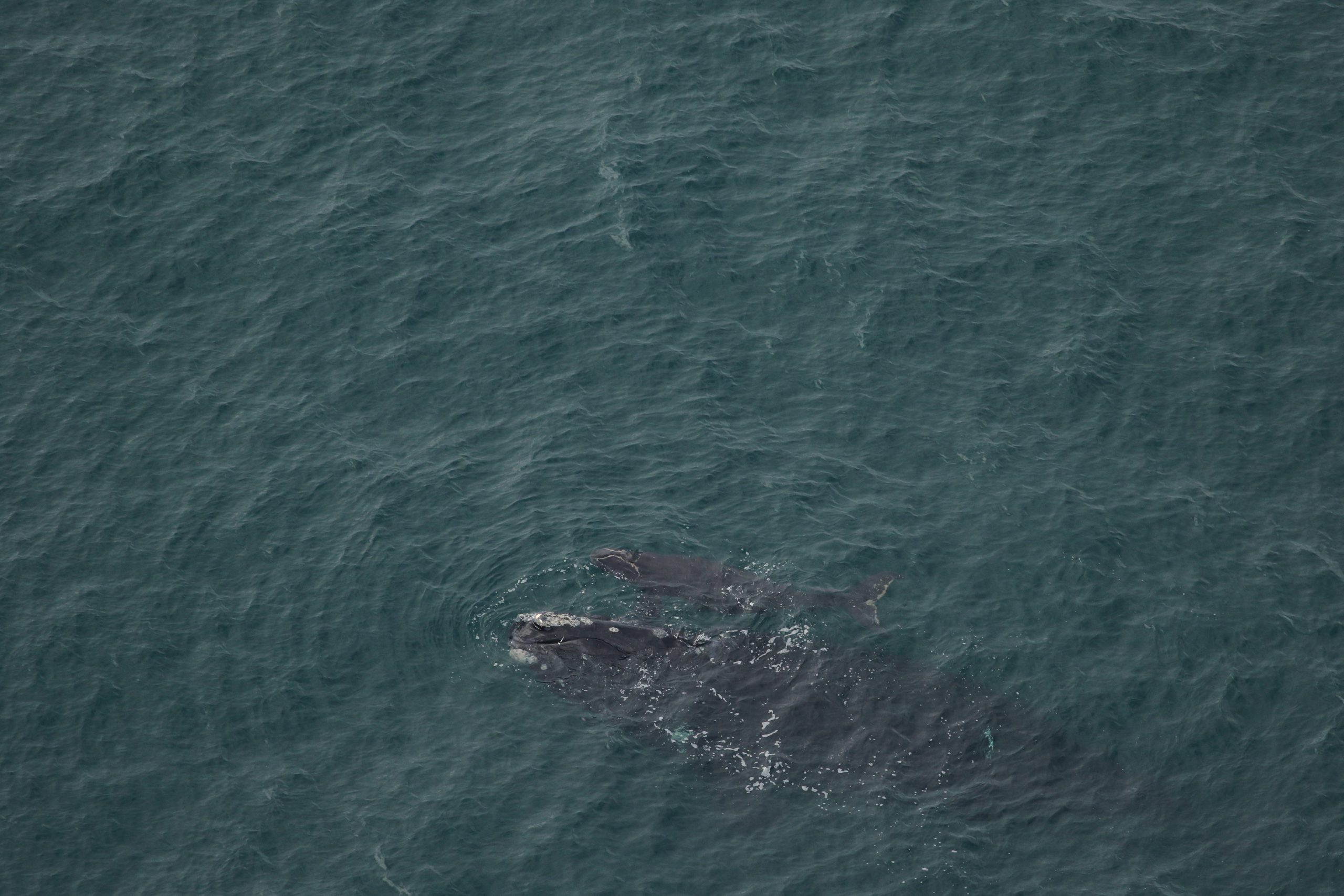 Right whale Catalog #1711 and calf, sighted December 17, 2022, approximately 16nm east of Cape May, GA. Photo credit: Clearwater Marine Aquarium Research Institute and United States Army Corps of Engineers, taken under NOAA permit #20556-01
Right whale Catalog #1711 and calf, sighted December 17, 2022, approximately 16nm east of Cape May, GA. Photo credit: Clearwater Marine Aquarium Research Institute and United States Army Corps of Engineers, taken under NOAA permit #20556-01
Surveys funded by USACE
Birth year: 1987
Age: 36 years old
Last calving year: 2017
Previous calves: 3 (Catalog #3311 – Bridle, Catalog #3996 – Calanus, Catalog #4711 – Whirligig)
Other relatives: 3 known siblings (Catalog #2110, Catalog #3110, Catalog #3792 – Coupe)
Direct human impacts: 3 entanglements
Human impacts on family members: 11 entanglements & 1 vessel strike
Catalog #1711 was seen by Clearwater Marine Aquarium’s South Carolina team off Georgia on December 17, 2022. Catalog #1711 is 36 years old, and her first sighting was with her mother (Catalog #1710) in 1987. That sighting was the first sighting of her mother as well!
Catalog #1711 has three siblings and three known offspring, but she’s the only female out of the bunch. Her family is no stranger to injuries, with 14 combined entanglement events and one vessel strike, some of which have likely resulted in more premature deaths for this species. Her latest calf, Whirligig (Catalog #4711), was in the recent cohort of whales to get named, along with Medusa, the first mom of this season! Read about the newly named right whales of 2022!
Porcia – Catalog #3293
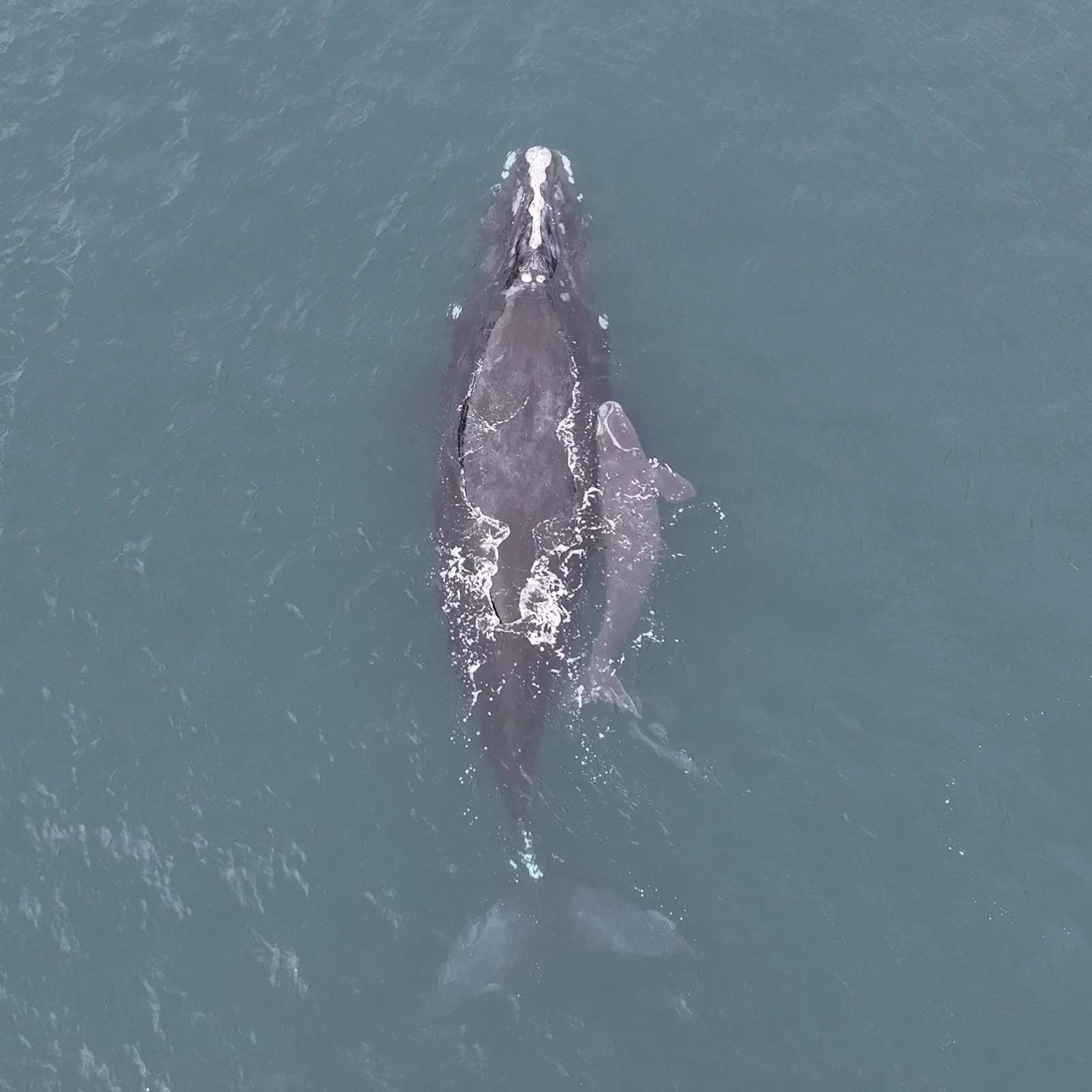 Right whale Porcia (Catalog #3293) was spotted by a Georgia DNR/Clearwater Marine Aquarium boat team ~10 miles southeast of Ossawbaw Island, GA, on December 17, 2022. Photo credit: Georgia Department of Natural Resources, taken under NOAA permit #21371-04
Right whale Porcia (Catalog #3293) was spotted by a Georgia DNR/Clearwater Marine Aquarium boat team ~10 miles southeast of Ossawbaw Island, GA, on December 17, 2022. Photo credit: Georgia Department of Natural Resources, taken under NOAA permit #21371-04
Birth year: Unknown (first seen in 2002)
Age: >21 years old
Last calving year: 2011
Previous calves: 2 (Catalog #3893, Catalog #4193)
Other relatives: N/A
Direct human impacts: 2 entanglements
Human impacts on family members: 5 entanglements
Porcia was seen with her third known calf on December 17, 2022, off the Georgia coast. A Georgia Department of Natural Resources and Clearwater Marine Aquarium vessel survey team located the mother and calf pair, marking the third new calf this year. Porcia was sighted alone on December 6, making her calf 11 days old at most when they were seen together.
Another mom of unknown age, Porcia was first seen in 2002, making her at least 21 years old. She has what researchers call a “Roman nose,” which led to her name, after the Roman wife of Brutus. While Porcia has had some run-ins with fishing gear, she’s been lucky compared to her previous offspring. Her first calf succumbed to an entanglement at the age of 10. Porcia’s latest known calf was found floating dead, wrapped up in fishing gear, just shy of his second birthday. We can only hope that this current calf will go on to outlive both its siblings.
Archipelago – Catalog #3370
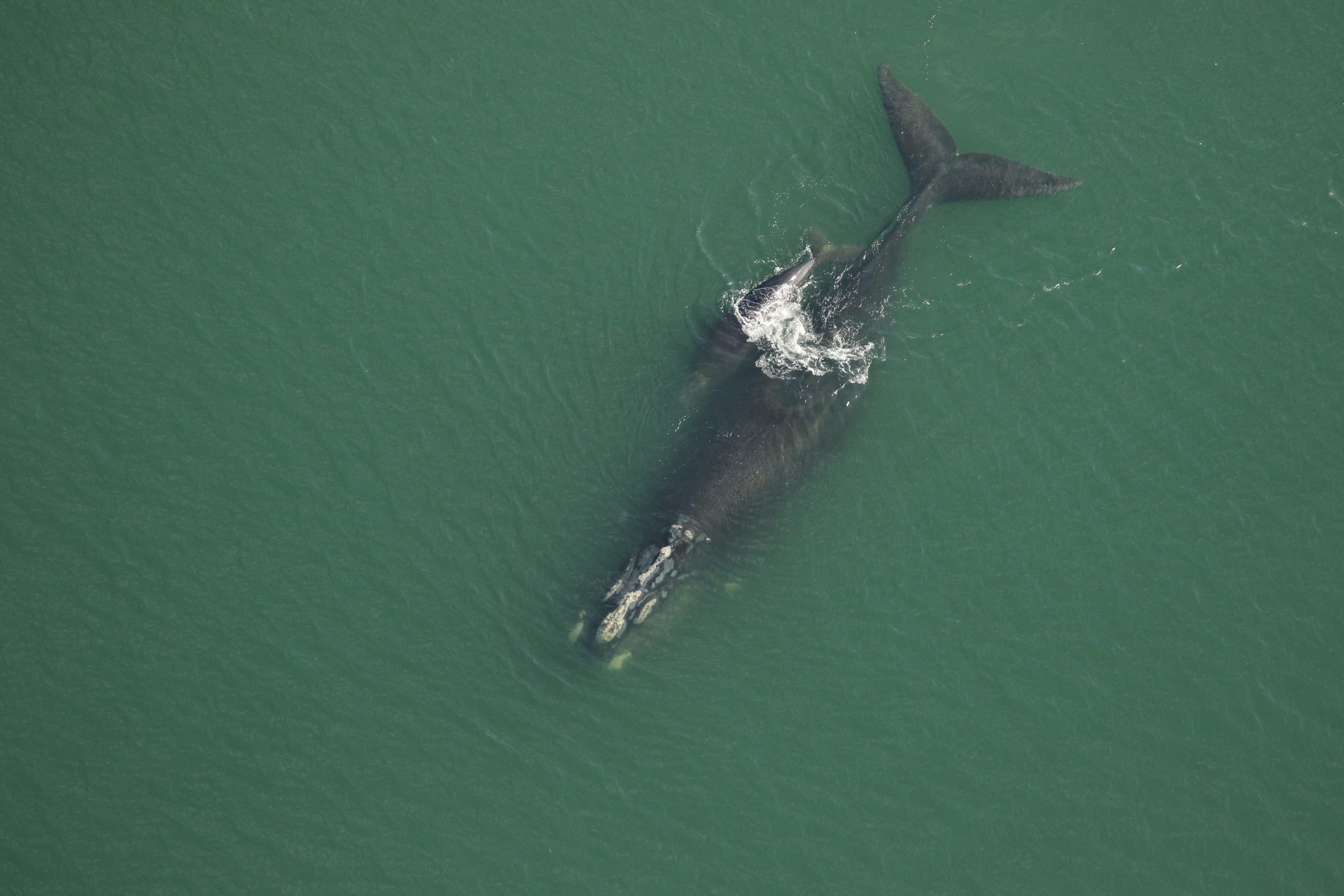 Right whale Catalog #3370 “Archipelago” sighted December 8, 2022, approximately 4nm off Little St. Simons Island, GA. Catalog #3370 is at least 20 years old and last gave birth four years ago during the 2019 winter calving season. This is her third calf. Photo credit: Florida Fish and Wildlife Conservation Commission, NOAA permit #20556-01
Right whale Catalog #3370 “Archipelago” sighted December 8, 2022, approximately 4nm off Little St. Simons Island, GA. Catalog #3370 is at least 20 years old and last gave birth four years ago during the 2019 winter calving season. This is her third calf. Photo credit: Florida Fish and Wildlife Conservation Commission, NOAA permit #20556-01
Birth year: Unknown (first seen in 2003)
Age: >20 years old
Last calving year: 2019
Previous calves: 2 (Catalog #3997, and a 2019 calf that is yet to be cataloged)
Other relatives: N/A
Direct human impacts: 1 entanglement
Human impacts on family members: 2 entanglements
Archipelago was seen by Florida Fish & Wildlife’s survey team with her third calf on December 8, 2022, off the coast of Georgia. Another mom of unknown age, she was first seen in 2003. She was named for the multiple callosity patches on her lip which resemble the islands of an archipelago. Both of her previous calves are still seen regularly. Though her 2019 calf has yet to be cataloged, it was seen as recently as this past spring, so it will hopefully be added to the catalog soon!
In contrast to the pattern of mothers waiting longer between each calf, Archipelago is trying to turn things around by waiting only a few years between calves. Hopefully, that’s a sign she is a healthy female, who has luckily only experienced one known entanglement, and she will go on to have many more calves.
Medusa – Catalog #1208
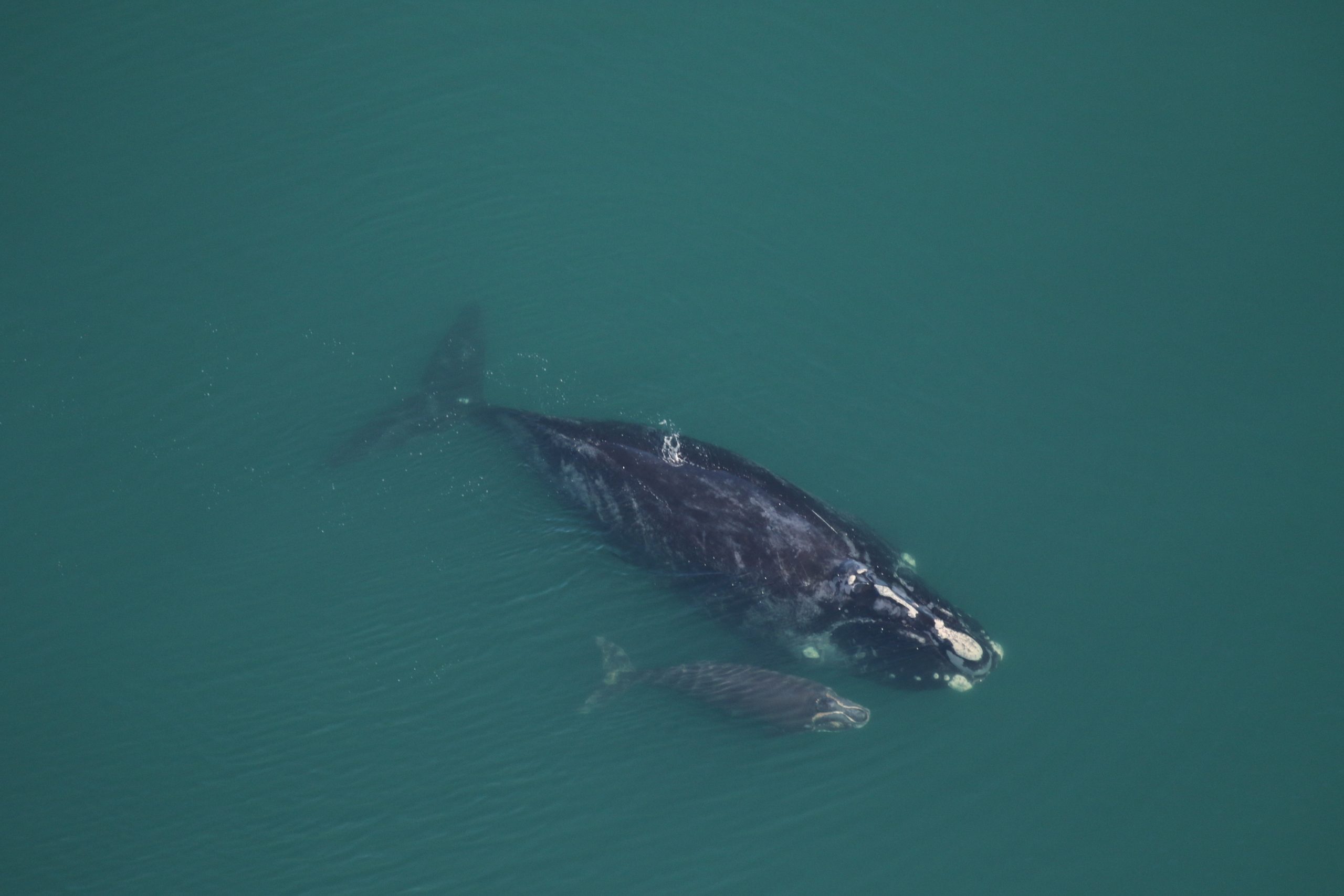 Right whale Catalog #1208 “Medusa” and calf, sighted December 7, 2022, approximately 11.4nm off St. Catherines Sound, GA. Catalog #1208 is >42 years old, and this is her seventh documented calf. Photo credit: Clearwater Marine Aquarium Research Institute, taken under NOAA permit#20556
Right whale Catalog #1208 “Medusa” and calf, sighted December 7, 2022, approximately 11.4nm off St. Catherines Sound, GA. Catalog #1208 is >42 years old, and this is her seventh documented calf. Photo credit: Clearwater Marine Aquarium Research Institute, taken under NOAA permit#20556
Birth year: Unknown (first seen in 1981)
Last calving year: 2012
Previous calves: 6 (Catalog #2640, Plover – Catalog #3340, Marlin – Catalog #3850, and 3 uncataloged calves)
Other relatives: N/A
Direct human impacts: 2 entanglements
Human impacts on family members: 7 entanglements and 1 vessel strike
Our first mom of the season, Medusa (Catalog #1208), was seen with her seventh calf by Clearwater Marine Aquarium Research Institute on December 7, 2022. Medusa, recently named for the callosity at the tip of her head that resembles the medusa form of a jellyfish, was first seen in 1981 as a whale of unknown age. Three of her calves have yet to enter the North Atlantic Right Whale Catalog (this means we’ve been unable to link an adult sighting to the calf sighting by photographic identification or genetics), but the other three have all been seen in recent years! Marlin (Catalog #3850) was seen several times by our own research teams this past winter and spring and even made the front page of The Washington Post in an article about our research team. Between Medusa and her three male offspring, the whales have experienced a collective nine entanglements and one vessel strike, which resulted in the loss of part of Plover’s tail. With this calf’s birth 11 years after her previous calf, Medusa is continuing the recent trend of females increasing the time between calves far beyond the usual three years.

